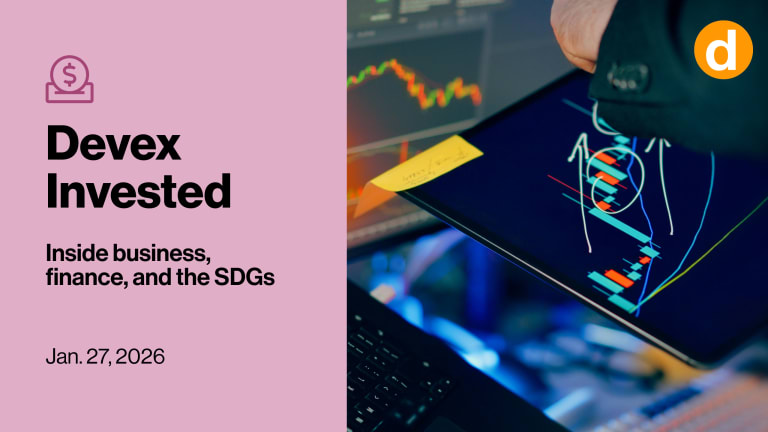Indian social entrepreneurs devise COVID-19 relief funding solutions

Social entrepreneurs working to provide emergency humanitarian relief during the second wave of COVID-19 in India are facing unprecedented challenges.
This is not only because of the scale of the problems at this stage of the pandemic, but also because local NGOs cannot access the funds they need to respond, in part due to new requirements for groups to secure licenses before they can receive foreign funding.
Increasingly, these organizations are coming together to coordinate their work and come up with creative financing solutions.
COVD-19 first responders in India have a critical need for flexible grant funding in the immediate term. But there is space for more innovative financing mechanisms as the country moves from relief to rebuilding and recovery, experts from the country said last week at an event organized by Catalyst 2030, a movement of social entrepreneurs focused on the Sustainable Development Goals. They have asked funders to step up and meet this moment by getting resources to organizations as quickly as possible.
“People need to first survive these next few years and then look at returnable capital later.”
— Deval Sanghavi, co-founder and partner, DasraDasra, a strategic philanthropy organization based in Mumbai, has launched a campaign called #BacktheFrontline, which is raising $10 million to provide more than 100 NGOs across India with flexible and unrestricted support. The fund is being co-facilitated by social entrepreneurs from the Catalyst 2030 community.
Dasra has raised $7 million so far, and together with its partners — including local NGOs Swasti, Dharma Life, and Janvikas — it has supported 50 nonprofits that largely focus on addressing urban poor and marginalized, rural, and tribal communities.
This model of “social entrepreneurs raising money for social entrepreneurs” takes “power away from donors” who typically “aren’t as aware” about the needs of communities, said Deval Sanghavi, a co-founder and partner of Dasra.
The organization plans to raise a resilience fund of $50 million to $100 million to support organizations for the coming five years, as the country makes its way out of the crisis and works to regain lost ground on development indicators.
Because philanthropy alone cannot possibly meet the scale of the challenge in India, Catalyst 2030 members are also considering blended finance — the use of catalytic capital from philanthropic or public sources to increase private sector investment — as a way to draw in larger-scale financing.
“There is a time for every kind of funding,” said Jacob Mathew, CEO at Industree Foundation, which has traditionally focused on supporting rural Indian women in setting up and running creative manufacturing enterprises.
The immediate term, and likely the next six months, calls for unrestricted funding deployed in the fastest possible way, because organizations are burning through cash and need money to continue moving quickly.
“Without this we may see oxygen generators and plants still arriving that may not get deployed,” Mathew said in an email to Devex.
In the medium term, when the focus shifts from relief to rehabilitation and recovery, grant funding “can replace eroded and negative capital positions of micro and small enterprises,” Mathew said. And in the medium-to-long term, enterprises will need “reserve funds with at least a 90 day runway” to deal with new waves of COVID-19 or other large-scale disasters, he said. This is where blended financing mechanisms — whether grant, debt, or equity — could come in.
“What might we do today such that we are not out with begging bowls for funding over again a year down the line?” Mathew wrote. “There are many creative ways that the financial sector can pull out of its bag, for once perhaps driven by the need to do good and not greed!”
When faced with an emergency, organizations doing work on the ground don’t have time to write proposals and get money before taking action, said Shiv Kumar, an India-based social entrepreneur who started the COVID Action Collaborative.
He is developing a framework he is calling “postpaid financing” — or reimbursement for relief — for COVID-19 outcomes.
Essentially, NGOs that have already delivered relief — sometimes exhausting their existing resources to do so — can make a claim to a funding marketplace that identifies, vets, and onboards nonprofits. A third-party agency would verify the work, and then donors would pay for it after the fact.
Foreign aid regulations, donor fatigue stymie India COVID-19 response
As India’s COVID-19 outbreak stretches its health care system to the brink, NGOs working on the ground struggle to receive foreign aid due to the country’s regulations. For philanthropists pooling resources, donor fatigue is one of the challenges.
NGOs should be rewarded, not punished, for being first responders, which is why Kumar believes in this model, he said. He is now floating the idea to donors but so far has not had success. Kumar called on donors to think creatively alongside social entrepreneurs and take more risks, particularly in emergency response.
“Donors don’t want to fund ex post facto,” he told Devex. “I’m trying to open up a new kind of results-based financing that rewards people who move first.”
Sanghavi of Dasra cautioned against a tendency to view financial instruments as the solution to problems as complex as combating COVID-19 in India. Grant capital is needed now more than ever, with urgent needs ranging from hunger to education to health care, he said.
Blended finance models will help those who have an ability to pay for services, but that does not apply for a large and growing population in India, given COVID-19’s lasting effect on livelihoods, Sanghavi said.
“People need to first survive these next few years and then look at returnable capital later,” he said.
This coverage exploring innovative finance solutions and how they enable a more sustainable future, is presented by the European Investment Bank.

Search for articles
Most Read
- 1
- 2
- 3
- 4
- 5




